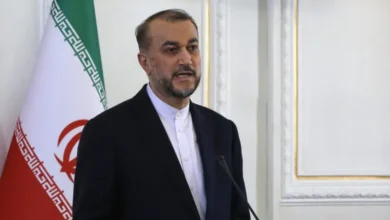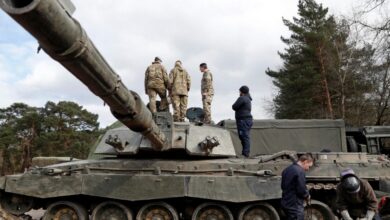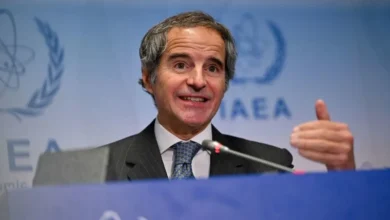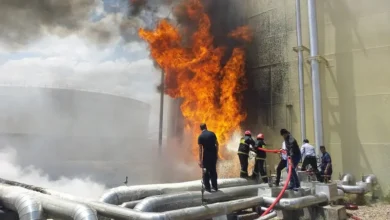Ukraine war: Did Putin learn from Bush’s Iraq horrors?
Twenty years ago, on May 1, 2003, then-United States President George W Bush announced the end of major combat operations in Iraq, a giant banner behind him triumphantly screaming, “Mission Accomplished”. Six weeks earlier, the US had invaded the Middle Eastern country illegally.
As US armour was rolling into Iraqi cities, international news networks replayed over and over again a scene from April 9 that year that in hindsight seems loaded with dramatic irony.The toppling of the statue of Saddam Hussein in Baghdad’s Firdos square — an event that turned out to be stage-managed — was meant to symbolise the liberation of Iraqis and the end of the Ba’ath Party’s 35-year-long rule in Iraq. Yet it was not the grand finale of the US invasion but rather the prelude to a long and bloody revolt and armed uprising.
The US occupation that lasted eight years created aftershocks of regional instability and left hundreds of thousands of Iraqis dead — so many that no one has an exact count.
Like the US-led coalition in Iraq back then, the Russian government expected its illegal invasion of Ukraine in 2022 to end with a quick and decisive victory.
Fooled by a sense of its own invincibility, the Russian army entered Ukraine as if on parade, in long columns that became easy targets for US-made Javelin missiles. They expected to be marching through the streets of Kyiv within days, but a year later, the Russians remain bogged down in a protracted and bloody war.So did Russian President Vladimir Putin end up repeating the mistakes — and for many, the crimes — of Bush in Iraq 20 years ago? How much do these two epoch-defining invasions have in common? What are the differences?
The short answer: The parallels run deep, from the false pretexts under which they were launched and the failings of the United Nations system that the wars showed up, to the use of private military contractors. But key differences exist in the deeper motivations that triggered the wars, said military historians and analysts. And the US military proved more effective at fighting a conventional war in Iraq than Russia has in Ukraine.‘We create our own reality’
Both the US-led coalition in Iraq and Russia in Ukraine were led to war by unbridled hubris — that is a “key element” that these two conflicts have in common, said Ibrahim al-Marashi, professor of Iraqi history at California State University. Both belligerents assumed it would be easy to launch “decapitation” attacks and replace the governments of the countries they were invading with friendly regimes that would simply serve their interests.
“In the US case they achieved the decapitation, but they really misread the Iraqi population,” says al-Marashi. “The US thought they would be greeted as liberators overthrowing Saddam Hussein, and that didn’t happen. What did Russia think? That the Ukrainians would also welcome them as liberators for overthrowing this so-called ‘fascist regime’.”
The outcome was the same in both cases — a “dogged national resistance that humbled both powers,” he said.
The hubris showed up in many ways.
Once senior Bush administration officials had made up their minds about invading Iraq, their single-minded determination to topple the Iraqi regime rendered them oblivious to the unintended consequences of war, said analysts.
It also blinded them to inconvenient truths — something neatly encapsulated in what a White House official reportedly told journalist Ron Suskind. “We’re an empire now, and when we act, we create our own reality,” the official said.
Creating their “own reality” meant ignoring international law and the United Nations Charter that the US and Soviet Union were original signatories to. The inability to stop the two bellicose powers from attacking sovereign states starkly exposed the weaknesses of the post-World War II international order.
Both Russia and the US went to war off the back of bogus pretexts — alternate realities they created. In the case of the US and its closest ally in the invasion of Iraq, the United Kingdom, dubious intelligence painted Saddam Hussein’s Iraq as a harbourer of al-Qaeda, a hoarder of weapons of mass destruction, and an all-around international bogeyman.
Al-Marashi has firsthand experience of this. A paper he wrote was plagiarised by the UK government in a 2003 document used to make the case for invading Iraq — the so-called “dodgy dossier”. Al-Marashi said his work was used in “constructing the image of a dictator who had to be overthrown”.
Russia constructed the image of a hostile administration in Kyiv that needed to be overthrown and took that lie to its absurd outer limits, portraying Ukraine’s Jewish president Volodymyr Zelenskyy as a depraved addict presiding over a government of neo-Nazis.
“The first ‘reason’ for Putin taking Ukraine was that he was saving the Ukrainians from this drug-crazed criminal Nazi gang running the country,” says Margaret Macmillan, professor of history at the University of Oxford. “And when it turned out that a lot of Ukrainians were supporting the drug-crazed criminal gang the war was now on the Ukrainians themselves, and then there was talk of re-educating them.”Different backdrops
As a state where power is concentrated in one man, Russia’s war in Ukraine is Putin’s war — the brutal incarnation of his own imperial designs, said experts.
According to Jade McGlynn, research fellow at the Department of War Studies at King’s College in London, and author of the book Russia’s War, the invasion of Ukraine “at its heart is a war over identity and conceptions of the [Russian] nation”.
Putin “conflated himself with the power structures of Russia,” said McGlynn, and “constructed a post-Soviet Russian identity that is very dependent on Ukraine and the idea of a greater Russia”.
For al-Marashi, who used to teach at Ukraine’s Ivan Franko University, Russia’s war has an undeniably imperial aspect to it that can be traced back to Ukraine’s incorporation into the Russian empire and deliberate policies of “Russification”, which attempted to deny Ukrainian culture and identity in the 19th century. This “imperial mindset” has a long history to it, said al-Marashi, from Catherine the Great’s description of Ukraine as ‘New Russia’ all the way to Putin. “Those are imperial linkages that I don’t think you can deny,” he said.
The US’s imperial mindset towards countries it has invaded and occupied is also hard to ignore, said experts. But there is a key difference highlighted by the contexts that set the stage for the wars in Iraq and Ukraine.
Russia, said Macmillan, “is the last standing European empire”. But it is a crumbling empire, and the speeches and revisionist historical treatises that laid Putin’s ideological groundwork for the invasion of Ukraine are often shot through with a sense of historical loss. Putin has lamented the breakup of the Soviet Union as a “genuine tragedy” in which “tens of millions of our fellow citizens and countrymen found themselves beyond the fringes of Russian territory”.
His war arose out of the perceived loss of Russia’s greatness, its humiliation and betrayal at the hands of the West, and the desire to reclaim Russia’s place in the world, according to experts. “Putin was a KGB agent when he witnessed the collapse of the Soviet empire from East Germany,” said al-Marashi.
But it was very different for Bush, who “inherited the windfall” of the end of the Cold War and was “riding the emergence” of the US as the superpower in a unipolar world.









